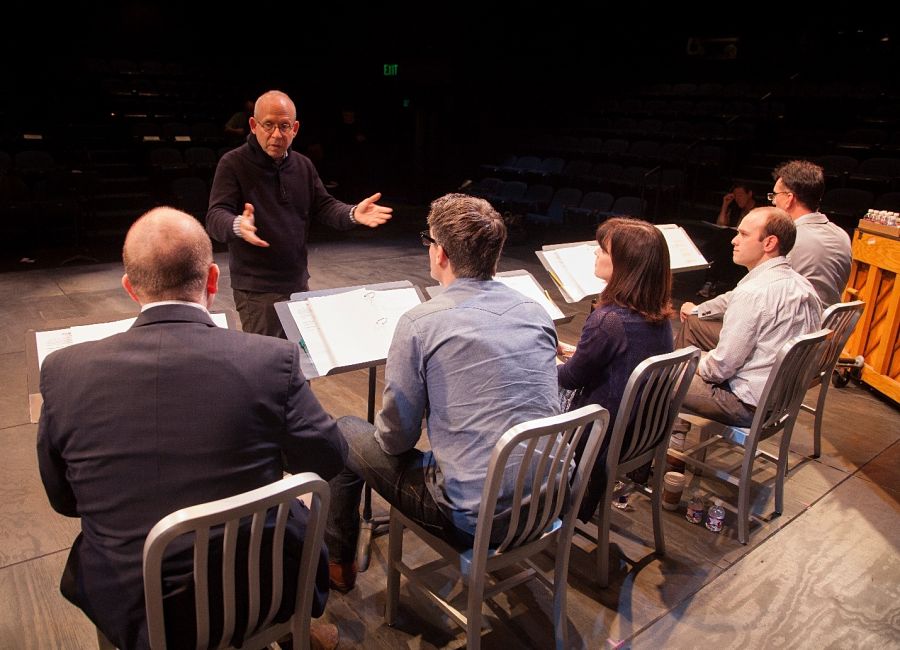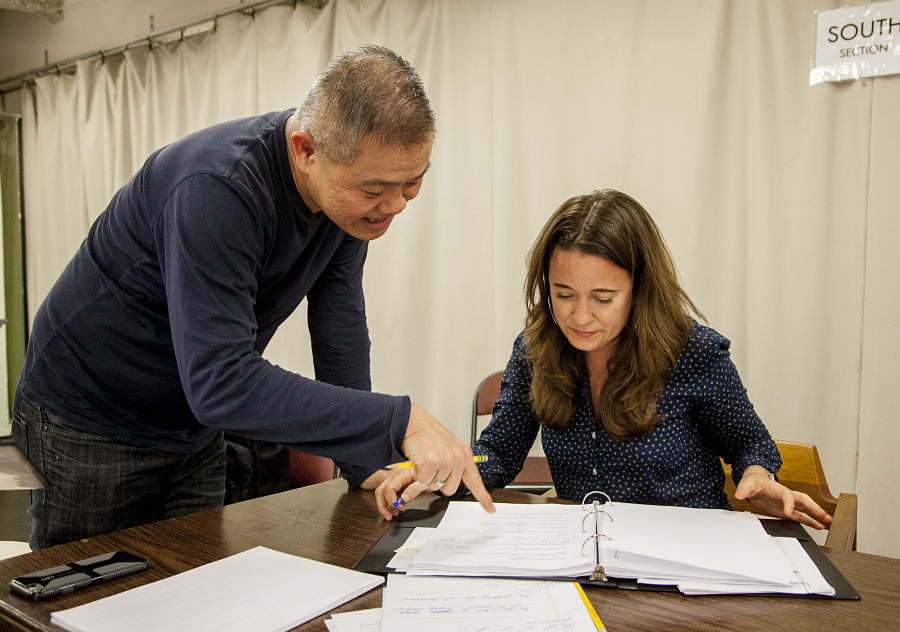HOUSTON: The Alley Theatre is having a big year. After opening its renovated two-theatre facility in the fall, the Tony-winning company broke new ground with the Alley All New Festival, which ran Jan. 28–Feb. 7, the theatre’s first new-play festival.
The event was the brain child of artistic director Gregory Boyd, director of new work Elizabeth Frankel, and literary manager Skyler Gray. Boyd’s institutional vision, combined with Frankel and Gray’s recent experience in cultivating new voices around the country—Frankel joined the Alley in 2015 after creating and running the New York Public Theater’s Emerging Writers Group, and Gray worked in new-works programs at Williamstown and South Coast Rep—allowed the festival to create a new avenue for development for experienced and emerging playwrights alike.
“We’ve done a lot of new plays, but it’s very hard to give the big stage to a new play unless the writer is someone like Edward Albee or Tony Kushner,” said Boyd. On the other hand, he added, “We didn’t want to ghettoize the new plays; we wanted them to have any space that was appropriate and whatever the writer wanted. So we renovated the new space so it’s much more friendly to new work, and at the same time, we initiated a program to develop the new plays.”
With full access to the theatre’s resident actors, design team, and rehearsal facilities, participating playwrights—Zak Berkman, Karen Hartman, Boo Killebrew, Kenneth Lin, Michael Moritz, Jack Murphy, NSangou Njikam, and Lawrence Wright—had as much as three to four weeks to work on their plays.
“This is a lot of work, and audiences get to see that this isn’t a playwright just sitting down and typing,” said Njikam, whose Syncing Ink was part of the festival. (He also performed in it.) “It’s night after sleepless night of rewrites and working with the actors, directors, and designers and figuring out what I really want to say. You’re going through all of that and that’s critical, and I think the audience gains a greater appreciation of theatre seeing that.”
Syncing Ink tells the coming-of-age story of a suburban black teenager trying to find his voice as an MC. Njikam played the determined protagonist Gordon, and his cast acted as an orchestra, improv comedy troupe, and rappers. With a live DJ and two turntables, Syncing Ink brought in audiences of all ages, including young people who rarely go to theatre as well as long-time subscribers. Njikam grew up immersed in the “golden age” of hip-hop, which inspired the play.
Wright was also inspired by his childhood when he wrote Cleo, which was directed by Bob Balaban. The play centers on the first meeting and the eventual tumultuous romance of Elizabeth Taylor and Richard Burton on the set of the 1963 film Cleopatra—a high-profile entertainment insider story that made headlines during the playwright’s young life.
Alley resident actors Elizabeth Bunch, Michael Brusasco, Todd Waite, Jeffrey Bean, Adam Gibbs and Melissa Pritchett had only a few days to work with Wright and Balaban on the project, which Wright has been working on since 1999. But Balaban said the cast had the right chemistry.
“We wanted to capture the way those very public people actually talked,” says Balaban. “It’s hard for anyone to take the stage but even harder still to do it as Cleopatra and Mark Antony and Elizabeth Taylor and Richard Burton. We’ve been trying to get it to the point where it can breathe in front of an audience. If they didn’t get it, we would have to do some major work.”

While Njikam and Wright revisited their childhoods, Hartman and Killebrew used their time in Houston to explore the pain and confusion experienced during two moments in American history. Hartman’s Roz and Ray is a two-person drama about a pediatric doctor and the father of two of her young, hemophiliac patients. The play spans the first wave of the AIDS epidemic, from 1976 to 1991. Hartman says she arrived at the festival with 80 percent of her play and explored and discovered how to complete the remaining 20 percent.
“What we’re working on here are not little things or added details,” says Hartman. “Think of it like music—if 80 percent of the notes are right, that’s not music; it’s noise. The difference between something that almost has the impact you want and something that does have the impact you want is all the difference in the world.”
Killebrew’s Miller, Mississippi begins in 1960 Mississippi during the Civil Rights Movement and spans through 1994. Directed by Lee Sunday Evans, the play starts with three white siblings listening to a ghost story from their beloved black maid Doris, and this illusion of Southern charm is shattered with the unexpected suicide of their father.
Berkman’s play The Harassment of Iris Malloy revolves around a single mother juggling low-paying jobs to pay the bills for her and her children, who has an unexpected late night encounter with a senator. Berkman’s focus during his time in Houston was on connecting the personal and the political and whittling down the big ideas in his play.
“Playwrights say they never read their reviews,” he said. “But I read one review that said I must have had a terminal illness, because of all the dozens of themes and topics I managed to squeeze into one play.”

Moricz and Murphy boasted the only musical of the lineup, Songs from Mrs. Mannerly. Based on Jeffrey Hatcher’s play Mrs. Mannerly and directed by Boyd, the show is set in Steubenville, Ohio in 1968. The musical follows a manners coach and her 10-year-old pupil.
The Alley commissioned Lin to adapt Mark Twain’s The Adventures of Huckleberry Finn for a new generation, and during the festival, he presented two scenes that respond to Twain’s work while retaining elements from the novel.
Before the reading began, Lin, whose plays Intelligence Slave and Warrior Class have been produced at the Alley, addressed one question: Why should an Asian American tell the story of one of the pillars of white American literature? His response: Why not?
“As an Asian writer, there’s a tacit but very clear question of what you get to write about,” says Lin. “You feel like you’re limited to a narrow subject matter based on your ethnicity. Can I just write as just an American citizen? This is the great American novel. I’m an American. I’m owning this.”
Boyd, Frankel and the rest of the Alley leadership don’t want these plays to exist in a developmental vacuum. Boyd says a full production will be on the immediate horizon for several of this year’s plays (indeed, Berkman’s Iris Malloy will be produced at People’s Light in June, and Hartman’s Roz and Ray at both Seattle Rep and Victory Gardens in the fall). But for now, it’s just time to experiment.
“This isn’t meant to be their big, opening night, world-premiere production,” said Frankel. “They’re all working as hard as they can, but it’s also nice to have a little bit of the pressure off.”





